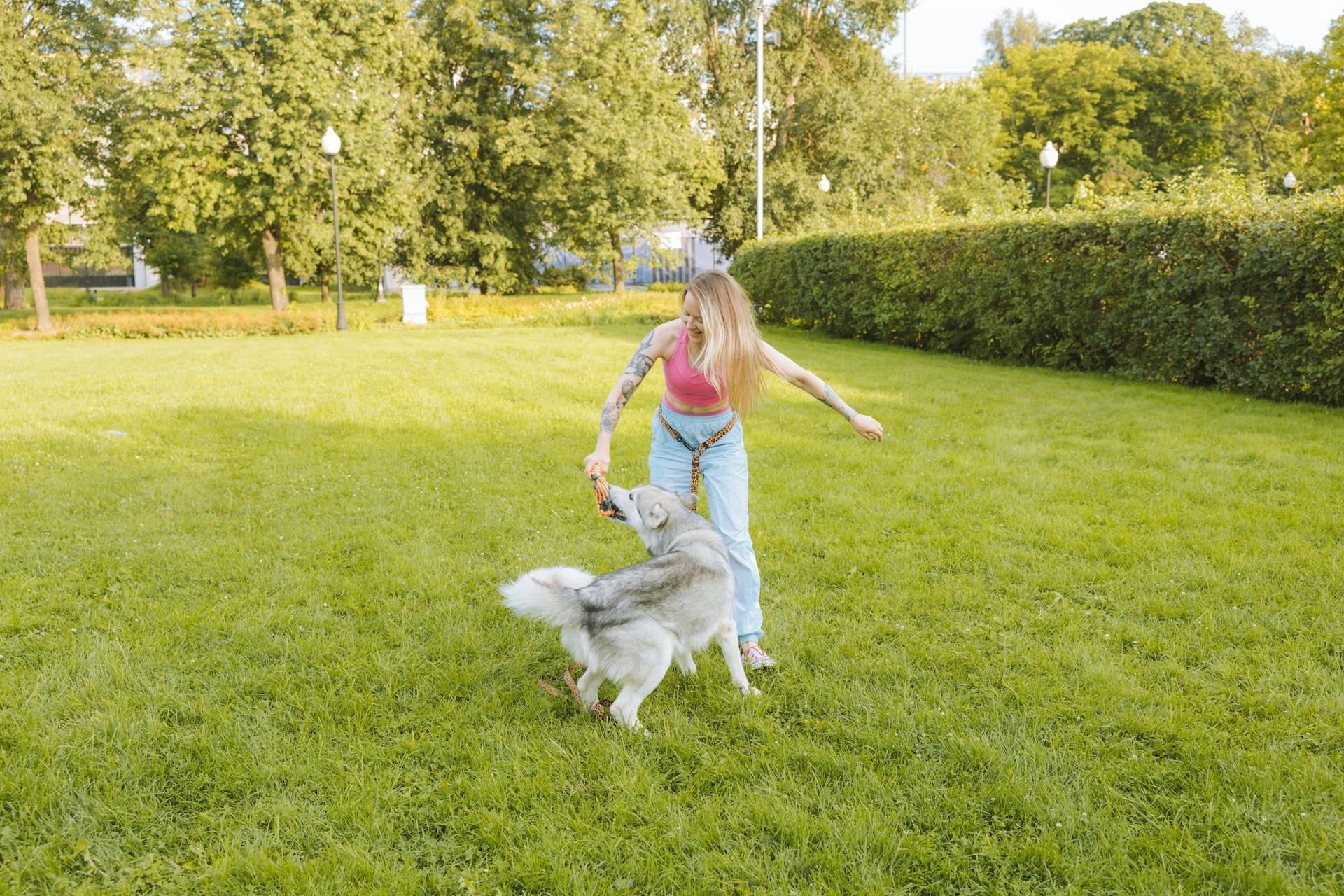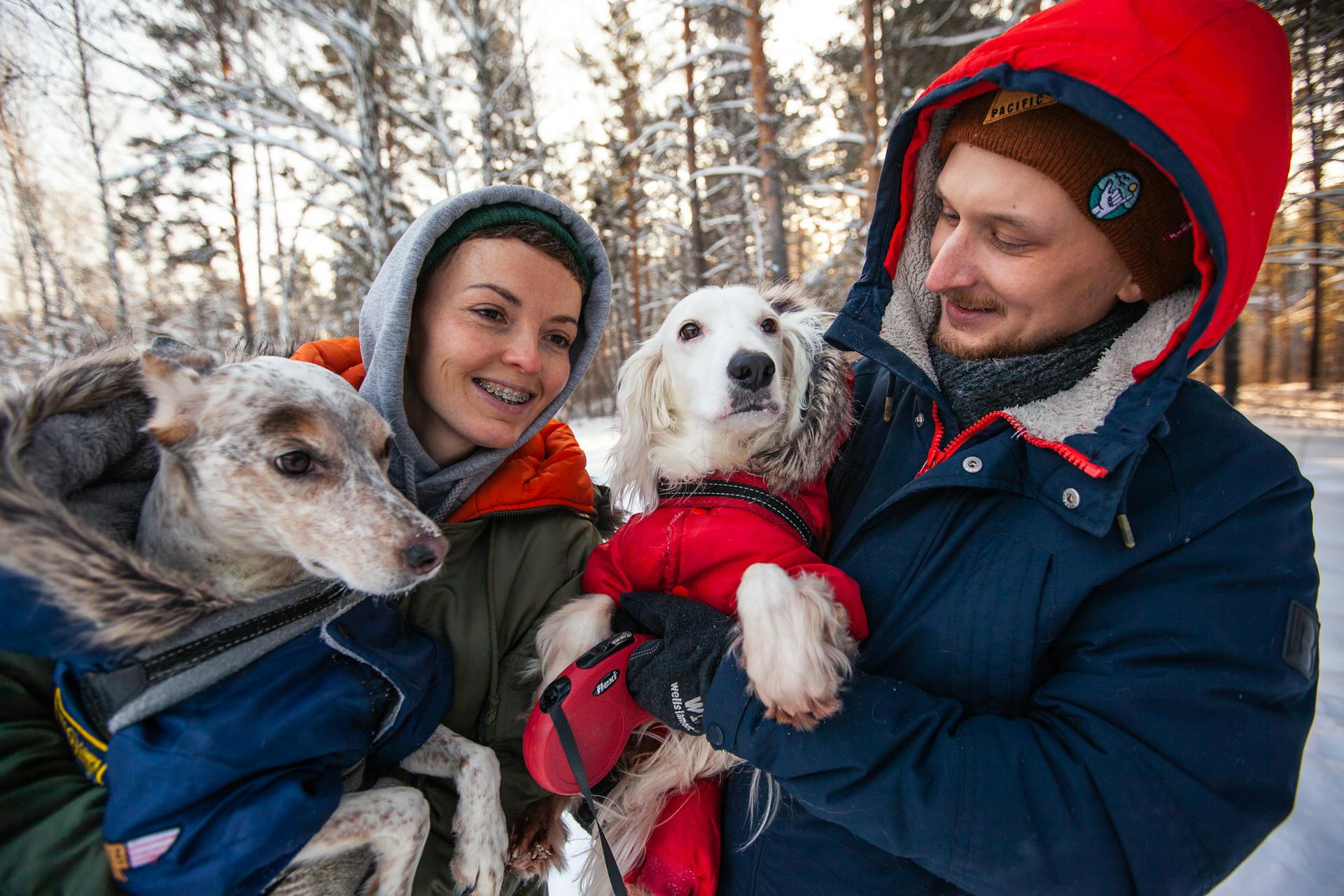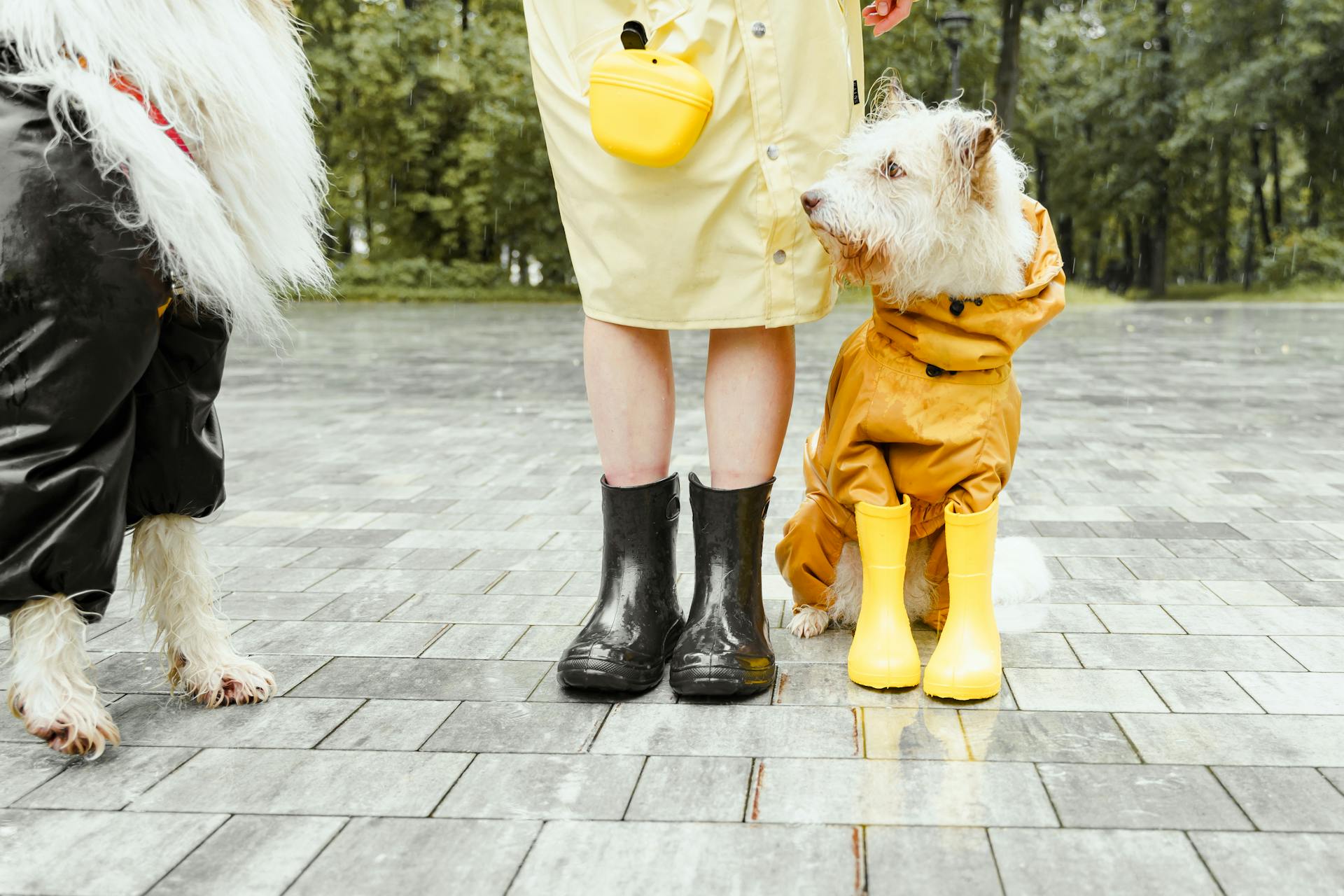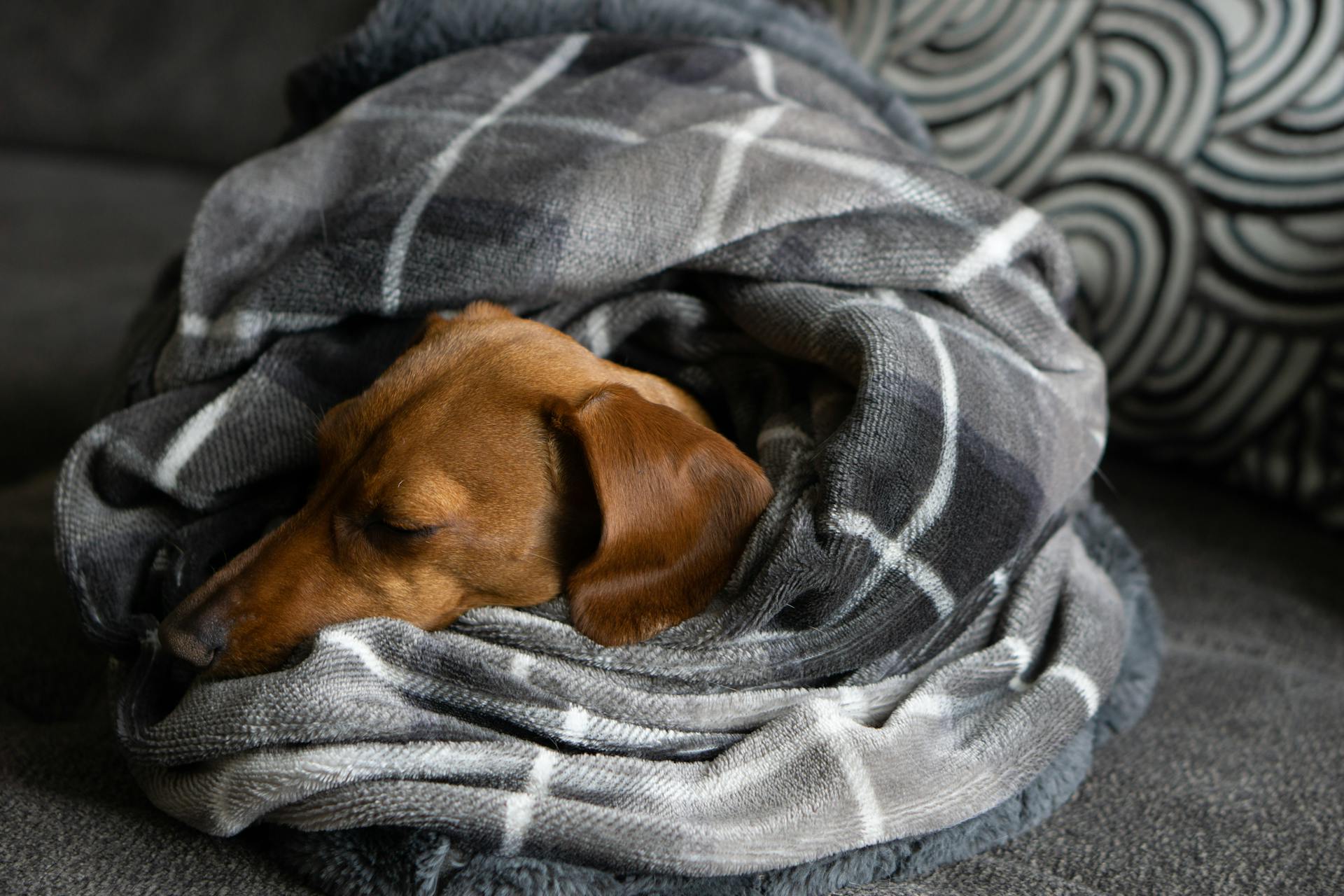
Siberian Huskies have specific dietary needs to maintain their optimal health and energy levels. They require a balanced diet that includes high-quality protein sources.
A good starting point is to feed your Husky a nutrient-rich dog food that contains at least 22% protein from animal sources. This can come from meat, poultry, or fish.
Nutritional Basics
Siberian Huskies are carnivores and require a diet rich in protein to stay healthy. Meat sources like chicken, beef, turkey, lamb, duck, and fish are staples in a Husky's diet.
Protein is essential for a Husky's coat and skin, and it also plays a crucial role in muscle development and tissue repair.
Protein
Protein is essential for a healthy coat and skin, for muscle development, tissue repair, and as an energy source.
Huskies, in particular, prefer a high-protein diet and get most of their protein from meat sources.
Meat sources include chicken, beef, turkey, lamb, duck, and fish, which are all nutritious options for your furry friend.
Organs and animal by-products such as the heart, liver, kidneys, and lungs are also great sources of animal protein.
Some grains and oilseeds, like soybeans, can also provide a good amount of protein for your dog.
Carbohydrates
Carbohydrates are a great way to give your dog's diet an energy boost, and they're generally safe for huskies unless they have a known dietary intolerance.
Grains, potatoes, tapioca, and legumes are all good sources of energy for dogs. They can be a welcome addition to a high-quality protein diet.
Fruits and vegetables are packed full of vitamins and minerals that can help keep your canine friend fit and healthy.
Feeding Your Husky
Siberian Huskies are known to require a relatively small amount of food for their size, since they were bred for endurance to pull sleds over great distances with little sustenance.
Each dog is unique and will have different requirements, which is why it's recommended to make an appointment with your vet to discuss an appropriate complete and balanced diet for your pet.
Feeding your Husky high-quality dog food is essential for healthy skin and coat.
Huskies can shift their metabolism over time, a survival tactic traceable to their Siberian origins, where they were used to pull sleds incredible distances in extreme cold.
For more insights, see: Samoyed Dog Husky
This means they can slow their metabolism to reduce the number of calories that their bodies burn, making their food last longer.
If your Husky does not eat all of their food, you should still offer them food every day, and try again the next day.
It's normal for new dogs to take a few days to get onto a regular eating schedule, and stress from moving into a new environment can upset their stomach.
After about three days, this should level out, and your new Husky should be comfortable enough to eat and potty normally.
Avoid foods with artificial dyes, and read the ingredient labels to do your research in advance.
If your dog is seven years or older, consider feeding them a senior food blend to provide them with adequate nutrition.
Remember, treats add calories to your current diet, so be mindful of overfeeding, which can lead to obesity and related health issues.
Puppy and Adult Stages
Siberian Huskies have specific nutritional needs at different stages of their lives.
Huskies are considered medium breed dogs, and their life stages are divided into three categories: puppy, adult, and senior.
Puppies under 12 months require a diet rich in nutrients to support their rapid growth and development.
A Husky puppy needs to eat a high-quality puppy food that's formulated for medium breed dogs.
The ideal diet for a Husky puppy includes a balance of protein, fat, and carbohydrates, along with essential vitamins and minerals.
Here's a quick rundown of the Husky life stages, so you can tailor your pup's diet accordingly:
Huskies become adults after 12 months, and their nutritional needs change accordingly.
At this stage, they require a balanced diet that meets their energy needs for daily activities.
Adult Huskies can thrive on a high-quality adult dog food that's formulated for medium breed dogs.
Senior Huskies
Older huskies need more protein in their diets than younger dogs.
As they age, seniors must replace wasting muscle mass, just like humans do. This means their diet should prioritize high-quality protein sources.
You may wish to consider a dog food that contains above-average protein and below-average calories.
Wild and Domestic Huskies
Wild and Domestic Huskies thrive on a diet rich in protein and fat from animal sources, such as meat and fish, as seen in the diets of their ancestors in the wild.
Their high energy needs are met through a diet consisting of 25-30% protein and 15-20% fat from animal sources.
In contrast, domestic huskies can easily become overweight if their owners overfeed them, leading to health problems.
A good rule of thumb for feeding your domestic husky is to provide 2-3% of their body weight in food per day.
Their ancestors, the Chukchi people, fed their sled dogs a diet of mostly whale and seal meat, which provided them with the necessary nutrients for endurance and strength.
This diet is still recommended for wild and domestic huskies today, with the addition of other nutrient-rich foods such as fish and eggs.
Health and Safety
Siberian huskies are prone to certain health issues, so it's essential to monitor their diet closely.
Their diet should be balanced, with a mix of high-quality protein, moderate fat, and complex carbohydrates.
A balanced diet can help prevent issues like hip dysplasia, which can be caused by excessive weight gain.
Siberian huskies need regular exercise to stay healthy, and a balanced diet is crucial to support their physical activity.
Their ideal weight range is between 35-60 pounds, and a well-planned diet can help them maintain a healthy weight.
A diet rich in omega-3 fatty acids, found in fish oil, can also help reduce inflammation and improve their coat health.
Regular veterinary check-ups can help identify any potential health issues early on, and a healthy diet is a key part of maintaining their overall health.
See what others are reading: Problems with Siberian Huskies
Frequently Asked Questions
What food do Huskies like the most?
Huskies thrive on high-protein diets rich in meat sources like chicken, beef, and fish. A protein-rich diet is essential for their overall health and well-being.
Sources
- https://www.greencrossvets.com.au/pet-library/dogs/breed-guides/siberian-husky-owners-guide/
- https://timberwolfpet.com/blogs/dog-nutrition/what-do-huskies-eat-husky-diet-explained
- https://www.dogfoodadvisor.com/best-dog-foods/siberian-huskies/
- https://www.huskyhalfwayhouse.org/feeding-your-husky
- https://www.petsworld.in/blog/siberian-husky-feeding-guidelines.html
Featured Images: pexels.com


